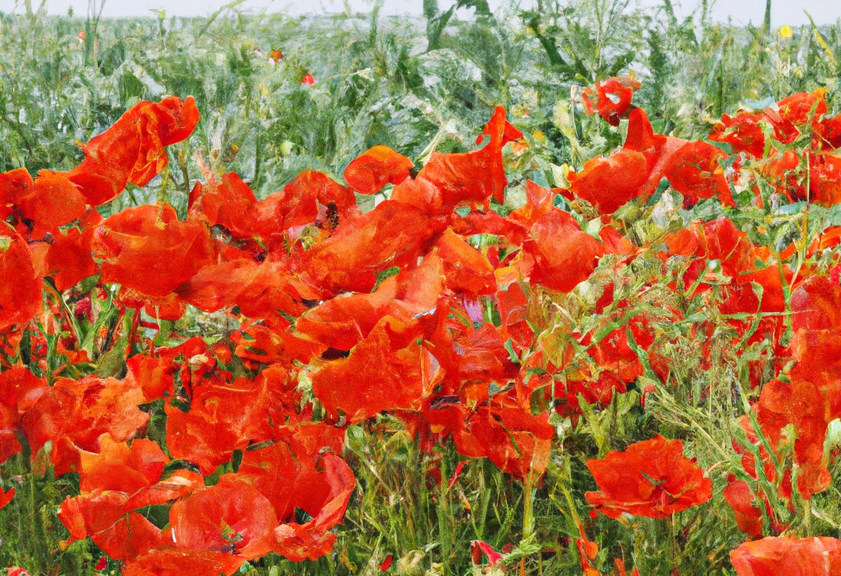In Flanders fields the poppies blow
Between the crosses, row on row,
………..If ye break faith with us who die
We shall not sleep, though poppies grow
In Flanders fields.
This is the iconic poem written by John McCrae while World War 1 raged, shortly before he too became one of the 40,000,000 million or so people who died during that horrific, meat grinder of a war.
More than 61,000 Canadian soldiers, like McCrae, died in that awful war, and at least 170,000 were seriously wounded – many losing limbs and eyes.
And only a few decades later, World War 2 – really just a continuation of that first European civil war – took in excess of 40,000 more Canadian lives. Canadians were fighting against pure evil. Most were young men struck down in what should have been the prime of their lives
These brave men fought to safeguard the freedom and values that Canada stands for. That Canada didn’t start in 1867. It was formed long before then in a crucible of ancient Greeks, the Jews of Jerusalem, through the Roman Empire, the building of Britain, and the enlightenment. Not every Canadian soldier could articulate every nuance of exactly what that long journey that created Canadian freedom stood for, but they certainly knew why they were willing to sacrifice their lives to preserve what they loved. John McCrae knew exactly what he was fighting for, and he paid the ultimate price.
But what about his challenge to Canadians of today? Have we accepted that torch from failing hands, and held it high?
Or have we broken faith with those who died to save the Canada that he and so many others gave their lives for? What would John McCrae think of Canada today?
Let’s take a look first at Canada’s armed forces. During McCrae’s time, and right through WW2, and the Korean War that followed, Canada punched well above its weight internationally. Canada had a strong army, and our leaders were universally respected. Prime Minister Lester Pearson became the first and only Canadian Prime Minister to win a Nobel Prize for his deft handling of the Suez crisis.
Canada continued to stand strong on the international stage into the 1960s. Our military was strong, Canadian leaders were respected, and we contributed our fair share to our international commitments, such as NATO.
Then came the Pierre Trudeau years. The integration of the Canadian Armed Forces (CAF) in February 1968, while supposedly to increase efficiency, was in fact a brutal exercise in cost cutting, reducing the Army, Navy, and Air Force strengths from over 105,000 to 70,000. The senior Trudeau even wanted to take Canada out of NATO, and was only dissuaded from that bit of insanity by dire warnings from advisers, and threats from allies that doing so would have dire consequences for Canada, domestically and internationally.
The 1980s saw a return to the common-sense realization that Canada must support its armed forces. Total strength of the combined armed forces was expanded to 85,000, and commitments to NATO were honoured. Canada once again was respected by its allies, and once again Canada was punching above its weight on the international stage. In fact, the Mulroney government’s contribution to the ending of South African apartheid was one of our finest hours.
Canada’s armed forces once again felt supported and respected.
But that was then. And this is now. Canada has gone from that place of respectability to a very low place indeed. And virtually everything that has been done since the Justin Trudeau Liberals took power in 2015 has made things so much worse. Slash and burn is probably the best way to describe their military policy. A series of cuts since 2015 have rendered our armed forces virtually toothless. The latest cruel decision to cut a further one billion dollars from the armed forces can almost be seen as an in-your-face insult to our people in uniform.
Canada still has proud and capable men and women in our armed forces. But they are being emasculated by an uncomprehending government that insists on using Canadians’ hard-earned money for every Woke cause in the book – everything except our defence needs. We now completely rely on the Americans to defend us. We have extremely diminished capacity to honour our NATO commitments. Our international partners no longer take us seriously.
I think we can safely say that John McCrae would not be impressed with what has been done with his beloved army, and our reputation abroad.
The current federal government has no interest in rebuilding our debilitated armed forces. In fact, the Prime Minister candidly admitted that he has no intention of even trying to meet Canada’s NATO commitments.
Under his leadership only further cuts to our armed forces can be expected.
As stated in the National Post, there is simply not enough money to fund both a strong army, and the Trudeau government’s socialist pet projects. So, the army must go begging.
However, the current government will not be here forever. Planning must begin now to rebuild our forces, honour our international commitments, and regain our rightful place on the world stage.
In 1967, Canada proudly celebrated the centenary: a country to be proud of for our freedom, peace and internal unity. These values had been bought with the blood of our youth. Today, Canada is no longer considered a trusted ally. Until our nation takes national security seriously, Canada will remain irrelevant, both externally and internally.
Brian Giesbrecht, retired judge, and David Redman, retired Lieutenant Colonel in Canadian Army, are Senior Fellows at the Frontier Centre for Public Policy



